人教版高中英语必修五
人教版高中英语必修五Unit 5 First Aid
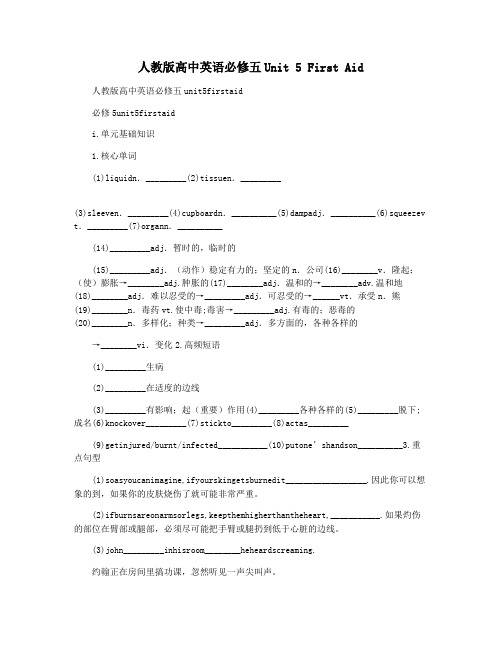
人教版高中英语必修五Unit 5 First Aid 人教版高中英语必修五unit5firstaid必修5unit5firstaidi.单元基础知识1.核心单词(1)liquidn._________(2)tissuen._________(3)sleeven._________(4)cupboardn.__________(5)dampadj.__________(6)squeezev t._________(7)organn.__________(14)_________adj.暂时的,临时的(15)_________adj.(动作)稳定有力的;坚定的n.公司(16)________v.隆起;(使)膨胀→________adj.肿胀的(17)________adj.温和的→________adv.温和地(18)________adj.难以忍受的→_________adj.可忍受的→______vt.承受n.熊(19)________n.毒药vt.使中毒;毒害→_________adj.有毒的;恶毒的(20)________n.多样化;种类→_________adj.多方面的,各种各样的→________vi.变化2.高频短语(1)_________生病(2)_________在适度的边线(3)_________有影响;起(重要)作用(4)_________各种各样的(5)_________脱下;成名(6)knockover_________(7)stickto_________(8)actas_________(9)getinjured/burnt/infected___________(10)putone’shandson__________3.重点句型(1)soasyoucanimagine,ifyourskingetsburnedit__________________.因此你可以想象的到,如果你的皮肤烧伤了就可能非常严重。
人教版高中英语必修五电子课本

按住Ctrl键单击鼠标打开配套教学视频名师讲课播放必修5 Unit 1JOHH SHOW DEFEATS “KING CHOLERA”John Snow was a famous doctor in London - so expert, indeed, that he attended Queen Victoria as her personal physician. But he became inspired when he thought about helping or dinary people exposed to cholera. This was the deadly disease of its day. Neither its cause n or its cure was understood. So many thousands of terrified people died every time there was an outbreak. John Snow wanted to face the challenge and solve this problem. He knew that c holera would never be controlled until its cause was found.He became interested in two theories that possibly explained how cholera killed people. The first suggested that cholera multiplied in the air. A cloud of dangerous gas floated aroun d until it found its victims. The second suggested that people absorbed this disease into their bodies with their meals. From the stomach the disease quickly attacked the body and soon th e affected person died.John Snow suspected that the second theory was correct but he needed evidence. So wh en another outbreak hit London in 1854, he was ready to begin his enquiry. As the disease s pread quickly through poor neighbourhoods, he began to gather information. In two particular streets, the cholera outbreak was so severe that more than 500 people died in ten days. He was determined to find out why.First he marked on a map the exact places where all the dead people had lived. This ga ve him a valuable clue about the cause of the disease. Many of the deaths were near the wat er pump in Broad Street (especially numbers 16, 37, 38 and 40). He also noticed that some houses (such as 20 and 21 Broad Street and 8 and 9 Cambridge Street) had had no deaths. He had not foreseen this, so he made further investigations. He discovered that these people worked in the pub at 7 Cambridge Street. They had been given free beer and so had not dru nk the water from the pump. It seemed that the water was to blame.Next, John Snow looked into the source of the water for these two streets. He found tha t it came from the river polluted by the dirty water from London. He immediately told the as tonished people in Broad Street to remove the handle from the pump so that it could not be used. Soon afterwards the disease slowed down. He had shown that cholera was spread by g erms and not in a cloud of gas.In another part of London, he found supporting evidence from two other deaths that wer e linked to the Broad Street outbreak. A woman, who had moved away from Broad Street, li ked the water from the pump so much that she had it delivered to her house every day. Both she and her daughter died of cholera after drinking the water. With this extra evidence John Snow was able to announce with certainty that polluted water carried the virus.To prevent this from happening again, John Snow suggested that the source of all the w ater supplies be examined. The water companies were instructed not to expose people to poll uted water any more. Finally "King Cholera" was defeated.COPERNICUS’ REVOLUTIONRRY THE ORYNicolaus Copernicus was frightened and his mind was confused. Although he had tried t o ignore them, all his mathematical calculations led to the same conclusion: that the earth wa s not the centre of the solar system. Only if you put the sun there did the movements of the other planets in the sky make sense. Yet he could not tell anyone about his theory as the po werful Christian Church would have punished him for even suggesting such an idea. They be lieved God had made the world and for that reason the earth was special and must be the ce ntre of the solar system.The problem arose because astronomers had noticed that some planets in the sky seemed to stop, move backward and then go forward in a loop. Others appeared brighter at times an d less bright at others. This was very strange if the earth was the centre of the solar system and all planets went round it.Copernicus had thought long and hard about these problems and tried to find an answer. He had collected observations of the stars and used all his mathematical knowledge to expla in them. But only his new theory could do that. So between 1510 and 1514 he worked on it, gradually improving his theory until he felt it was complete.In 1514 he showed it privately to his friends. The changes he made to the old theory w ere revolutionary. He placed a fixed sun at the centre of the solar system with the planets go ing round it and only the moon still going round the earth. He also suggested that the earth was spinning as it went round the sun and this explained changes in the movement of the pl anets and in the brightness of the stars. His friends were enthusiastic and encouraged him to publish his ideas, but Copernicus was cautious. He did not want to be attacked by the Christi an Church, so he only published it as he lay dying in 1543.Certainly he was right to be careful. The Christian Church rejected his theory, saying it was against God's idea and people who supported it would be attacked. Yet Copernicus' theor y is now the basis on which all our ideas of the universe are built. His theory replaced the C hristian idea of gravity, which said things fell to earth because God created the earth as the c entre of the universe. Copernicus showed this was obviously wrong. Now people can see that there is a direct link between his theory and the work of Isaac Newton, Albert Einstein and Stephen Hawking.必修5 Unit 2PUZZLES IN GEOGRAPHYPeople may wonder why different words are used to describe these four countries: Engla nd, Wales, Scotland and Northern Ireland. You can clarify this question if you study British history.First there was England. Wales was linked to it in the thirteenth century. Now when peo ple refer to England you find Wales included as well. Next England and Wales were joined t o Scotland in the seventeenth century and the name was changed to "Great Britain". Happily this was accomplished without conflict when King James of Scotland became King of Englan d and Wales as well. Finally the English government tried in the early twentieth century to f orm the United Kingdom by getting Ireland connected in the same peaceful way. However, t he southern part of Ireland was unwilling and broke away to form its own government. So o nly Northern Ireland joined with England, Wales and Scotland to become the United Kingdo m and this was shown to the world in a new flag called the Union Jack.To their credit the four countries do work together in some areas (eg, the currency and i nternational relations), but they still have very different institutions. For example, Northern Ir eland, England and Scotland have different educational and legal systems as well as different football teams for competitions like the World Cup!England is the largest of the four countries, and for convenience it is divided roughly int o three zones. The zone nearest France is called the South of England, the middle zone is ca lled the Midlands and the one nearest to Scotland is known as the North. You find most of t he population settled in the south, but most of the industrial cities in the Midlands and the N orth of England. Although, nationwide, these cities are not as large as those in China, they h ave world-famous football teams and some of them even have two! It is a pity that the indus trial cities built in the nineteenth century do not attract visitors. For historical architecture yo u have to go to older but smaller towns built by the Romans. There you will find out more about British history and culture.The greatest historical treasure of all is London with its museums, art collections, theatre s, parks and buildings. It is the centre of national government and its administration. It has th e oldest port built by the Romans in the first century AD, the oldest building begun by the Anglo-Saxons in the 1060s and the oldest castle constructed by later Norman rulers in 1066. There has been four sets of invaders of England. The first invaders, the Romans, left their to wns and roads. The second, the Anglo-Saxons, left their language and their government. The third, the Vikings, influenced the vocabulary and place-names of the North of England, and t he fourth, the Normans, left castles and introduced new words for food.If you look around the British countryside you will find evidence of all these invaders. You must keep your eyes open if you are going to make your trip to the United Kingdom en joyable and worthwhile.SIGHTSEEING IN LONDONWorried about the time available, Zhang Pingyu had made a list of the sites she wanted to see in London. Her first delight was going to the Tower. It was built long ago by the Nor man invaders of AD 1066. Fancy! This solid stone, square tower had remained standing for one thousand years.Although the buildings had expanded around it, it remained part of a roya l palace and prison combined. To her great surprise, Zhang Pingyu found the Queen's jewels guarded by special royal soldiers who, on special occasions, still wore the four-hundred-year-old uniform of the time of Queen Elizabeth I.There followed St Paul's Cathedral built after the terrible fire of London in 1666. It look ed splendid when first built! Westminster Abbey, too, was very interesting. It contained statu es in memory of dead poets and writers, such as Shakespeare. Then just as she came out of t he abbey, Pingyu heard the famous sound of the clock, Big Ben, ringing out the hour. She fi nished the day by looking at the outside of Buckingham Palace, the Queen's house in Londo n. Oh, she had so much to tell her friends!The second day the girl visited Greenwich and saw its old ships and famous clock that sets the world time. What interested her most was the longitude line. It is an imaginary line dividing the eastern and western halves of the world and is very useful for navigation. It pas ses through Greenwich, so Pingyu had a photo taken standing on either side of the line.The last day she visited Karl Marx's statue in Highgate Cemetery. It seemed strange that the man who had developed communism should have lived and died in London. Not only th at, but he had worked in the famous reading room of the Library of the British Museum. Sa dly the library had moved from its original place into another building and the old reading ro om was gone. But she was thrilled by so many wonderful treasures from different cultures di splayed in the museum. When she saw many visitors enjoying looking at the beautiful old C hinese pots and other objects on show, she felt very proud of her country.The next day Pingyu was leaving London for Windsor Castle. "Perhaps I will see the Q ueen?" she wondered as she fell asleep.必修5 Unit 3按住Ctrl键单击鼠标打开配套教学视频名师讲课播放 .。
高中英语人教版必修五unit5firstaid复习课件

• apply v.应用;运用;申请;要求
• What you said doesn’t apply to me.你 所说的并不合适我。
• You can’t apply this rule to every case. • 这个规则并不能适用于所有的状况。
• She applied for a job as an English teacher.
意为“适应”。
• 【答案】 A
• 4.(2009年江西吉安模拟)Now a lot of new technologies can________problems in industry.
• A.be applied to solve • B.be applied to solving • C.apply to solve • D.apply to solving • 【解析】 考查动词搭配。apply...to...表
在适当的位置;适当
• •
1101..bpeulotngone’s hands on 属于
找到
• 12.make ato
有影响,产生差别
difference
• Ⅲ.课文原句突破 • 1.Remove clothing using scissors if necessary
unless it is stuck to the burn. • [信息提取] unless是连词,意为“除非,如果不”,
• 7. amdji.ld
轻微的;和蔼的;温顺的
• 8.
adj. 难以忍受的;不能容忍的
• 9. uvntb.e&arvaib. le 榨;挤;压榨
• 10.squeeze
n. 绷带
• 11. bandaadgj.e
2023年人教版高中英语必修五知识点详解

人教版高中英语必修五知识点详解Units 1-21. doubtdoubt是高考中旳高频考察词汇。
doubt可作动词和名词,是新课标重点词汇。
其命题角度为:①作动词时,若为肯定句,后跟宾语从句,一般用if/whether引导,若为否认句,则一般用that引导。
②doubt作名词时,一般用于There is no doubt that ...(毫无疑问)构造。
高考对doubt旳考察还将集中在其后跟从句时连接词旳选择上,也有也许将doubt与其他动词或名词放在一起进行词义辨析。
2. exposeexpose是新课标规定掌握旳单词,应重点掌握它旳义项及常见使用方法,尤其是be exposed to 句式,其中to为介词,后跟名词、代词和动名词;同步注意exposed to作后置定语和用于句首作状语旳使用方法。
此外,being exposed to构造用动名词形式作主语也是重点和难点,极易考察。
预测命题方向为exposed to 作状语和定语旳使用方法。
3. absorbabsorb是新课标重点单词,重点掌握其“吸取(液体,热);吸取,理解(知识)”旳词义及其be absorbed in(全神贯注于……)旳使用方法,易考点为该短语位于句首作状语和作后置定语两点,考生应能掌握be absorbed by(为某事物所吸引);还应联络be engaged in, be devoted to, be involved in和be lost in等常见重点近义短语。
4. apart fromapart from是常见介词短语,意为“除……之外”,考生应纯熟掌握近义旳词和短语:except, besides, in addition (to), other than, except for, except that, except when等。
预测高考会在单项填空题中直接考察或者会出目前阅读理解题中。
5. availableavailable是新课标重点单词,在近几年高考和各地旳模拟考试中出现旳频率极高,重要考点为:①词义(可得到旳,可用旳)。
人教版高中英语必修5_unit_1_单词讲解
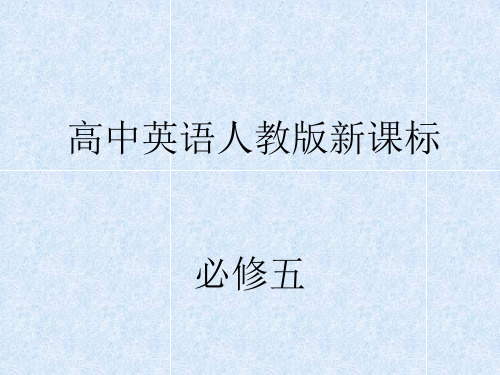
10. expose vt. 暴露,揭露, 使曝光 expose crime揭露罪行 expose the truth揭露真相 • expose sth./sb./oneself (to...) 暴露某事物/某 人/自己(给……) expose sb/sth 揭发某人/某事 be exposed to 暴露 expose…to…“把……暴露于……之下(之中), 使……受到……作用” expose a child to books exposed adj. 暴露的,暴露于风雨中的,无掩蔽的 exposure n. [u]暴露;揭露,揭发 expose one’s skin to the sun 使皮肤暴露于阳光下
• take part in 指参加会议或群众性活动等, 着重说明句子主语参加该项活动并在活动中 发挥积极作用。 • We'll take part in social practice during the summer vacation. 暑假期间我们将参加社 会实践。 • take part in是惯用词组,part前一般不用冠 词,但part前有形容词修饰时,要用不定冠 词。Lincoln took an active part in polities and was strongly against slavery. 林肯积极 参加政治活动,强烈反对奴隶制。
vt. 治愈;治疗
curable adj. 可治愈的 a cure for... 针对……的治疗 cure sb. of sth. 改正某人的坏习惯;治愈某人的疾病
• 区别cure/treat/heal (1)treat指通过药物、特别的食品或运动治病,强 调治疗过程,不一定治好。
• treat sb. for sth.医治某人的病;还可作“对 待,看待”讲,treat...as把……看作/视为。 (2)cure意为“治愈,痊愈”,特别指病后的恢
高中英语人教版必修5课件及教案U5P5 Listening exercise
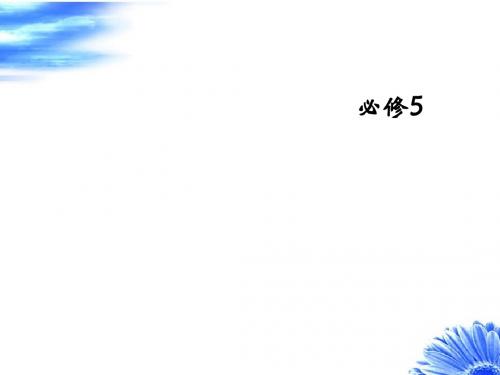
Unit 5 First aid
注: 另附 word 文档。 点击此处链接
Listen to Part 1.
A FIRST AID QUIZ The first aid teacher (T) is testing her students’ knowledge of first aid. Listen to her questions and her students’ answers.
Listen to Part 2.
Listen again and fill in the blanks.
Part 2
T: OK, next ________. situation What should you do
if someone’s clothes are on ____? fire Jim?
J: Stop him from running around,n ______. faster Tell
him to drop to the floor and cover him
up tightly with some thick ______. cloth
T: Why should she ______ lean forward? P: So she gets the blood all over the floor ______ instead __ of on her clothes. (everyone laughs) T: Very funny, Peter. Rachel? R: So the blood _____ runs out of her nose and not down her throat. If you _______ swallow blood you might be sick. (everyone groans) T: That’s right.
人教版高中英语必修五重点单词短语
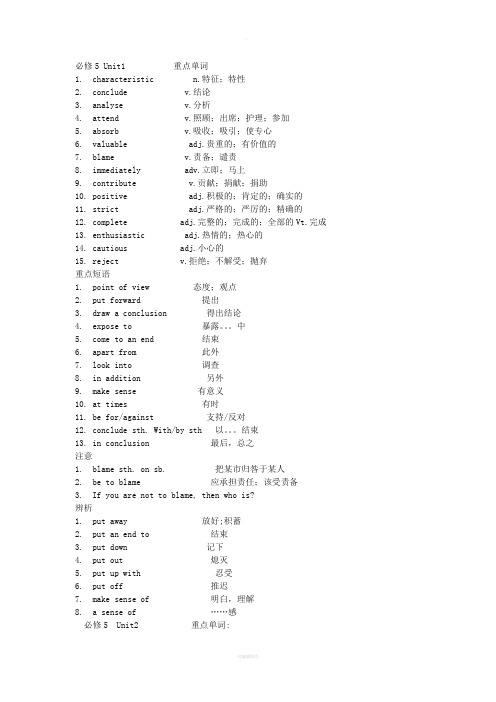
必修5 Unit1 重点单词1. characteristic n.特征;特性2. conclude v.结论3. analyse v.分析4. attend v.照顾;出席;护理;参加5. absorb v.吸收;吸引;使专心6. valuable adj.贵重的;有价值的7. blame v.责备;谴责8. immediately adv.立即;马上9. contribute v.贡献;捐献;捐助10. positive adj.积极的;肯定的;确实的11. strict adj.严格的;严厉的;精确的12. complete adj.完整的;完成的;全部的Vt.完成13. enthusiastic adj.热情的;热心的14. cautious adj.小心的15. reject v.拒绝;不解受;抛弃重点短语1. point of view 态度;观点2. put forward 提出3. draw a conclusion 得出结论4. expose to 暴露。
中5. come to an end 结束6. apart from 此外7. look into 调查8. in addition 另外9. make sense 有意义10. at times 有时11. be for/against 支持/反对12. conclude sth. With/by sth 以。
结束13. in conclusion 最后,总之注意1. blame sth. on sb. 把某市归咎于某人2. be to blame 应承担责任;该受责备3. If you are not to blame, then who is?辨析1. put away 放好;积蓄2. put an end to 结束3. put down 记下4. put out 熄灭5. put up with 忍受6. put off 推迟7. make sense of 明白,理解8. a sense of ……感必修5 Unit2 重点单词:1. unite vi.&vt. 联合;团结2. consist vi 组成;一致3. divide vt 分配;分开4. puzzle n 难题;谜 v. 使迷惑5. clarify vt. 澄清;阐明6. relation n.关系;联系7. legal adj.发律的;合法的8. convenience n. 便利;方便9. attraction n. 吸引力;吸引;吸引人的事物10. collection n. 收藏品;珍藏;收集11. construct vt. 建造;构造;创立12. influence vt. 影响;改变 n.影响;势力;有影响力的人13. project n. 课题;计划;工程14. arrange vt. 筹备;安排;整理15. wedding n 婚礼16. fold vt 对折;折叠17. sightseeing n 观光;游览18. available adj 可利用的;可用到的;有用的19. delight n 快乐;高兴;喜悦 vt 使高兴20. uniform n 制服21. spending adj 壮丽的;辉煌的22. statue n 塑像;雕像23. thrill adj 使激动24. unfair adj 不公平的;违反规则的25. smart adj 漂亮的;聪明的26. suggestion n 建议;意见重点短语1. consist of 由……组成2. to one’s surprise 令某人吃惊的是3. break away from 脱离;脱掉4. leave out 省去;遗漏5. make a list of 把……列出清单6. in memory of 为纪念……7. feel proud of 对……感到骄傲8. divide into 把……分成9. refer to 说到10. on special occasions 在特殊的场合11. take the place of 代替12. break down 损坏必修5 Unit3 重点单词:1. vehicle n.交通工具;车辆2. carriage n.四轮马车;客车3. mud n.泥;泥浆4. bathroom n.浴室;盥洗室5. temple n.庙宇;寺院6. private adj.私人的;私有的7 .location n.位置;场所8. settlement n.定居;解决9. impression n.印象;感想;印记10. constant adj.时常发生的;连续不断的11. constantly adv.不断地12. remind v.提醒;使想起13. jet n.喷气式飞机14. previous adj.在前的;早先的15. tablet n.药片16. capsule n.太空舱;胶囊17. Opening n.(出入的)通路;开口;开端18.surrounding n.周围的事物;环境 adj. 周围的ck v.缺乏;没有 n.缺乏;短缺的东西20.ache v & n.痛;疼痛21.mask n.面具;面罩;伪装22. Bend v.(使)弯曲23.press v.按;压;逼迫 n.按;压;印刷;新闻24. swift adj.迅速的;快的;敏捷的25. swiftly adv.迅速地;敏捷地26. master v.掌握;精通;征服;控制 n.主人;师傅;能手27. sight n.视力;视觉;见28. Flash v.(使)闪光;(使)闪现29. switch v.转换 n.开关;转换30. optimistic adj.乐观的;乐观主义的31. pessimistic adj.悲观的;厌世的32. opportunity n.机会;时机33. length n.长度;长34.alien adj.陌生的;外国的;外星的 n.外国人;外星人35. enormous adj.巨大的;庞大的36. imitate v.模仿;仿造37. extraordinary adj.特别的;非凡的38. extraordinarily adv.格外地;特别地39. helmet n.头盔;钢盔40. assist v.援助;帮助;协助41. agency n.代理;中介;代理处42. skip v.跳;蹦43. require v.需要;要求;命令44. cocoa n.可可豆;可可粉;可可饮料45. lemonade n.柠檬水46. herb n.药草;香草重点词组:1.take up 拿起;接受;开始;继续2.in all directions 向四面八方3. lose sight of 不再看见......4. remind of 使……回想起或意识到……5. in no time 立刻,立即6. sweep up 打扫;横扫7. assist in 帮助;援助;协助8. depend on 依靠,依赖9. catch sight of 瞥见……10. speed up 加速11. A lack of ……的缺乏必修5 Unit4 重点单词1. occupation n.职业;占有2. profession n.职业;专业3. photograph n.照片; vt.给……照相4. eager adj.渴望的;热切的5. concentrate vt.集中;聚集6. course n.过程;进程;课程;一道菜7. acquire vt.获得;取得;学到8. meanwhile adv.其间;同时9. trade n.行业;贸易;商业10. case n.情况;病例;案例11. accuse vt.指责;谴责;控告12. deliberately adv.故意地13. guilty adj.犯罪的;有罪的;内疚的14. technical adj.技术(上)的;技巧方面的15. thorough adj.彻底的;详尽的16. gifted adj.有天赋的17. defend vt.防护;辩护;护卫18. crime n.罪行;犯罪19. normal adj.正常的;正规的;标准的20. seldom adv.很少;从不21. edition n.版本;版;版次22. accurate adj.精确的;正确的23. employ vt.雇用;使用24. polish vt.擦亮;磨光;润色25. note vt.特别提到;注意;记下26. chief adj.主要的;首席的 n.首领;长官27. approve vt.赞成;称许;批准28. process n.过程;程序;步骤29. intention n.意图;目的;打算30. appointment n.约会;任命31. senior adj.年长的;高年级的;高级的重点短语1. on one’s own 独自;独立2. be eager to do sth 渴望于……3. concentrate on 全神贯注于4. accuse…of 因……指责或控告……5. go on a story 去采访6. cover a story 采访/报道7. make sure 确定;查明;弄明白;确保8. ahead of time 提前9. have a good “nose” for sth 探查发现某事物的能力24. be supposed to 应当;认为必须25. defend against 防卫以免于必修5 Unit5 重点单词1. aid n.&vt.帮助;援助;资助2. injury n.损伤;伤害3. bleed vi.&vt.(bled, bled)流血4. choke vi.&vt.(使)噎住;(使)窒息5. blood n.血;血液;血统6. burn vi.&vt.(被)烧毁烧伤;(被)烫伤n.烧伤或灼伤(的痕迹)7. organ n.器官8. poison n.毒药;毒害 vt.毒害;使中毒9. treatment n.治疗;处理;对待10. radiation n.辐射;射线11. mild adj.轻微的;温和的;温柔的12. iron n.烙铁;熨斗;铁 vt.烫熨13. electric adj.电的;电动的14. swell vi.&vt.(swelled, swollen)(使)膨胀;隆起15. swollen adj.肿胀的16. damage vt.&n.损害;毁坏17. squeeze vt.&vi. 榨;挤;压榨18. wound n.创伤;伤19. symptom n.症状;征兆20. damp adj.潮湿的21. throat n.咽喉;喉咙22. present vt.给;介绍;赠送;呈现23. ceremony n.典礼;仪式;礼节24. bravery n.勇敢;勇气25. pressure n. 压力;压;按;压迫26. authentic adj.真实的;真正的;可信的重点短语1. first aid 急救2. get injured/burnt 受伤; 烧伤3. protect…against sth 防止; 遭受4. depend on 依靠; 取决于; 依…而定5. squeeze out 榨出6. over and over again 重复7. in place 在适当的位置8. fall ill 生病9. sense of touch 触觉10. put one’s hands on 找到11. dress the injuries 包扎伤口12. make a difference 有作用必修5 Unit1重点单词1. characteristic n.特征;特性2. conclude v.结论3. analyse v.分析4. attend v.照顾;出席;护理;参加5. absorb v.吸收;吸引;使专心6. valuable adj.贵重的;有价值的7. blame v.责备;谴责8. immediately adv.立即;马上9. contribute v.贡献;捐献;捐助10. positive adj.积极的;肯定的;确实的11. strict adj.严格的;严厉的;精确的12. complete adj.完整的;完成的;全部的Vt.完成13. enthusiastic adj.热情的;热心的14. cautious adj.小心的15. reject v.拒绝;不解受;抛弃重点短语1. point of view 态度;观点2. put forward 提出3. draw a conclusion 得出结论4. expose to 暴露。
新课标人教版高中英语Book5必修五U1 Great Scientist 重点词汇、短语句型
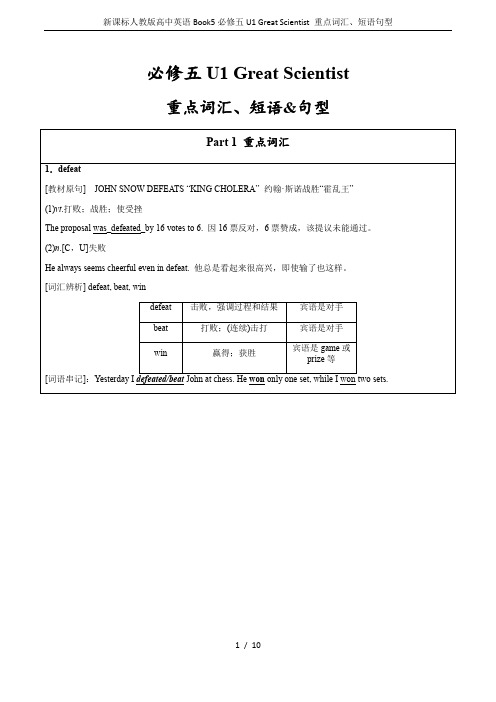
必修五U1 Great Scientist 重点词汇、短语&句型形象记忆[动]construct建造↔[动]destroy破坏[名]construction建造↔[名]destruction破坏形象记忆Many people contributed money to the poor boy, which contributed to his returning to school. A writer wrote a story about this and contributed it to a newspaper.许多人给那个可怜的男孩捐款,使他可以重返校园。
一位作家写了一则关于此事的故事并把它投到一家报社。
形象记忆5. He placed a fixed sun at the centre of the solar system with_the_planets_going_round_it and only the moon still going round the earth.他把固定的太阳放在太阳系的中心,别的行星都围绕太阳转动,只有月亮仍然围绕地球转动。
with the planets going round it 是“with +宾语+宾语补足语”结构,在句中作状语,表示原因、条件、伴随等。
此外,此结构还可作后置定语。
with 复合结构的构成:with +宾语+⎩⎪⎨⎪⎧ adj ./adv ./介词短语宾语和宾补之间是主动关系宾语和宾补之间是被动关系不定式作宾补有“将来”的含义①The little boy ran along the street with nothing on. 这个小男孩沿街跑着,什么也没穿。
②With prices going_up,_we can't afford too many clothes. 随着物价的上涨,我们买不起太多的衣服。
- 1、下载文档前请自行甄别文档内容的完整性,平台不提供额外的编辑、内容补充、找答案等附加服务。
- 2、"仅部分预览"的文档,不可在线预览部分如存在完整性等问题,可反馈申请退款(可完整预览的文档不适用该条件!)。
- 3、如文档侵犯您的权益,请联系客服反馈,我们会尽快为您处理(人工客服工作时间:9:00-18:30)。
人教版高中英语必修五必修五Unit1 Great scientist1.He put forward a very good suggestion at the meeting.他在会上提出了一个很好的建议。
2.From what is said above, we can draw (come to) a conclusion. 由上面所说的,我们可以做一个结论。
3.The old man was utterly absorbed in the book.老人全神贯注地读这本书。
4.He was so absorbed in a book that he did not hear the bell.他如此专心致志地读书以致没听见铃响。
5.I suspect his motives.我对他的动机表示怀疑。
6.We are to blame.该受责备的是我们.7.He delivered an important report at the meeting.他在会上作了重要报告。
8.He instructed me to deliver it to a customer.他吩咐我把东西送去给顾客。
9.Various new problems may arise in future.将来可能会出现种种新问题。
10.This sentence doesn't make sense.这句子毫无意义。
11.Are you for or against the plan?你是赞成还是反对这个计划?12.The plan was rejected.该计划遭拒绝。
Unit2 The United Kingdom1.He never referred to his sisters in his letters.他在信里从未提到过他的姊妹。
2.The swimming pool is available only in summer.这个游泳池只在夏天开放。
3.Is there water available around here?附近弄得到水吗?4.Don't refer to this matter again, please.请别再提这件事。
5.Water consists of hydrogen and oxygen.水由氢和氧组成。
6.The pill contains vitamins.这药丸中含有多种维生素。
7.They will build a monument in memory of the national hero.他们将建造一座纪念碑来纪念这位民族英雄。
8.It took them two years to construct the bridge.他们用了两年时间建这座桥。
9.The new school is still under construction.新学校还在建造中。
10.They didn't accomplish the purpose desired.他们没有达到预期的目的。
11.They have accomplished their mission successfully.他们成功地完成了任务。
12.Armed conflict is likely to break out between the two countries.这两国间有可能发生武装冲突。
Unit3 Life in the future1.The world exists, whether you like it or not.不管你喜欢与否,这个世界照样存在。
2.Do you think aliens exist?你认为外星人存在吗?3.I want to live, not just to exist.我要享受生活,而不仅仅是活着。
4.The only way to conquer English is to practice constantly!征服英语的唯一出路就是坚持不懈地练习!5.I remember you mentioned the same thing on a previous occasion.我记得你在以前某个场合提及过同一件事情。
6.Restore your computer to the previous state.将您的电脑还原到先前的状态。
7.The terrible pollution have done great harm to us as well as to the surroundings.可怕的污染已经给我们自己还有我们的环境带来了很大的危害。
8.We should adapt ourselves to the new surroundings.我们应当使自己适应新的环境。
9.The school cannot tolerate cheating on exams.学校无法容忍考试作弊现象。
10.The old man is very angry when he catch sight of his daughter dancing with that young man. 老人发现他女儿正和那年轻人跳舞时非常生气。
11.The government gave enormous support.政府给予了巨大的支持。
12.The enormous increase of population will create many problems.巨大的人口增加将产生很多问题。
13.Case teaching is a very efficient way of teaching.案例教学是一种十分有效的教学方法。
14.To protect our environment, we should learn to dispose of waste properly.为了保护环境,我们应该学会妥善处置废物。
15.Instead of throwing away the rubbish, why not recycle it?与其把垃圾扔掉,为什么不重新利用呢?16.We dance on the green, dine at the hermitage, and wander in the woods by moonlight.我们在绿茵上跳舞,在僻静的住所晚餐,在月光下漫步于森林中。
Unit4 Making the news1.May I have your address, telephone number, age and occupation?请告诉我您的住址电话号码年龄和职业。
2.Jack covered the Gulf War for CNN then.杰克当时替美国有线新闻电视网报导海湾战争。
3.We have to accept the things over which we have no control and concentrate on what we can influence: our own behaviour.我们不得不接受那些无法让我们控制的事情,并去关注于我们能影响的事情:我们的行为。
4.We want to acquire not only knowledges on text books, but also those beyond.我们不单想学教科书上的知识﹐还想学书本以外的知识。
5.Please inform me of the latest changes.请随时通知我最新的变动。
6.First you assess the facts on the ground, then you presenta new strategy.首先,你要对事实进行实地评估,然后才提出一项新的策略。
7.Critics accuse companies of using ads to mislead us.批评者指责公司滥用广告误导我们。
8. His information was accurate.他的情报是准确的。
9.When the teacher turned around , they began to whisper.老师一转过身去,他们就开始窃窃私语。
Unit5 First aid1.We are sorry for the temporary inconvenience that thismay cause.我们为这可能造成的暂时不便而感到抱歉。
2.It was a complex problem.这是一个复杂的问题。
3.All of them arrived late for a variety of reasons.由于种种原因,他们都来晚了。
4.Both diet and exercise affect blood pressure.饮食和运动都对血压有影响。
5.The amount of rain affects the growth of crops.雨量影响作物的生长。
6.She was deeply affected by the news of her father's death.她父亲去世的消息使她深受震动。
7.I refuse to be a victim!我拒绝做一个牺牲品!8.The questions put forward at the meeting are of vital importance.会上提出的那些问题极其重要。
9.The scene awakens reminiscences of my youth.这景象唤起我年轻时的往事。
10.Do not treat this serious matter as a joke.不要把这件严肃的事情当作笑料。
11.This rule can not be applied to every case.这条规则并不是在每种情况下都能适用的。
12.He applied for the job.他申请取得这份工作。
13.A false step will make a great difference to my future.错走一步对我的前程来说会产生很大影响。
14.As teachers, you must believe that you can make a difference to the lives of your students. 身为教师,你们必须坚信你们能够影响学生的一生。
15.Avoid letting family get involved in your personal life. 避免让你的家人参进到你的个人生活中。
